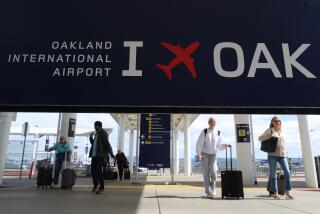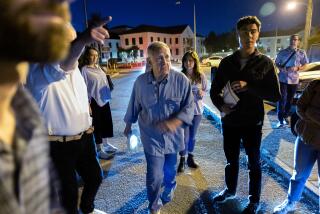Lawsuit Could Ground Burbank Airport Plans
- Share via
In a case that could undermine Burbank Airport’s bid to acquire land for a new terminal, attorneys for Lockheed Martin asked a jury Wednesday to force airport officials to pay $128 million for 130 acres owned by the company.
Lockheed Martin attorney Robert E. Willett said rising property values and the site’s proximity to the airport makes it worth more than three times the price set by the Burbank Glendale Pasadena Airport Authority.
The lawsuit, filed in Burbank Superior Court, challenges the price the airport authority said the property is worth. The case is expected to go to the jury today.
Lawyers for the airport authority, which moved to acquire the land by eminent domain in 1997, contend that soil contamination from years of defense manufacturing on the property makes it worth $40 million.
A ruling in Lockheed’s favor could force the authority to reduce its terminal design plans, or find a new location, according to officials familiar with the case.
“If the jury comes back with a verdict that’s high enough, the airport could conceivably have to walk away from the land,” said one official. “And that would be calamitous.”
The proposed replacement terminal has been the center of a long-running legal and political feud between Burbank Airport and the city of Burbank. Most of the fighting has been over the proposed expansion of terminal gates, as well as restrictions on commercial flights.
Recent talks have raised hopes that a compromise could be struck soon.
That debate, however, is not part of the case being heard before Burbank Superior Court Judge Carl J. West, which is limited to setting a price for the Lockheed property.
Lockheed lawyers criticized Burbank Airport attorneys for using what they said were scare tactics to convince the jury the land was worth less.
“In this case, a government agency wanted to take the property and low-ball the price,” Willett said during closing arguments. “They wanted to create the impression the property had a problem and was worth less.”
Willett added that despite the authority’s contention that asbestos and chromium contamination remain on the property, Lockheed had performed all necessary cleanup.
He said when the property changed hands, no regulatory agency had found any problems that would keep the airport from building a new terminal.
More to Read
Sign up for Essential California
The most important California stories and recommendations in your inbox every morning.
You may occasionally receive promotional content from the Los Angeles Times.













